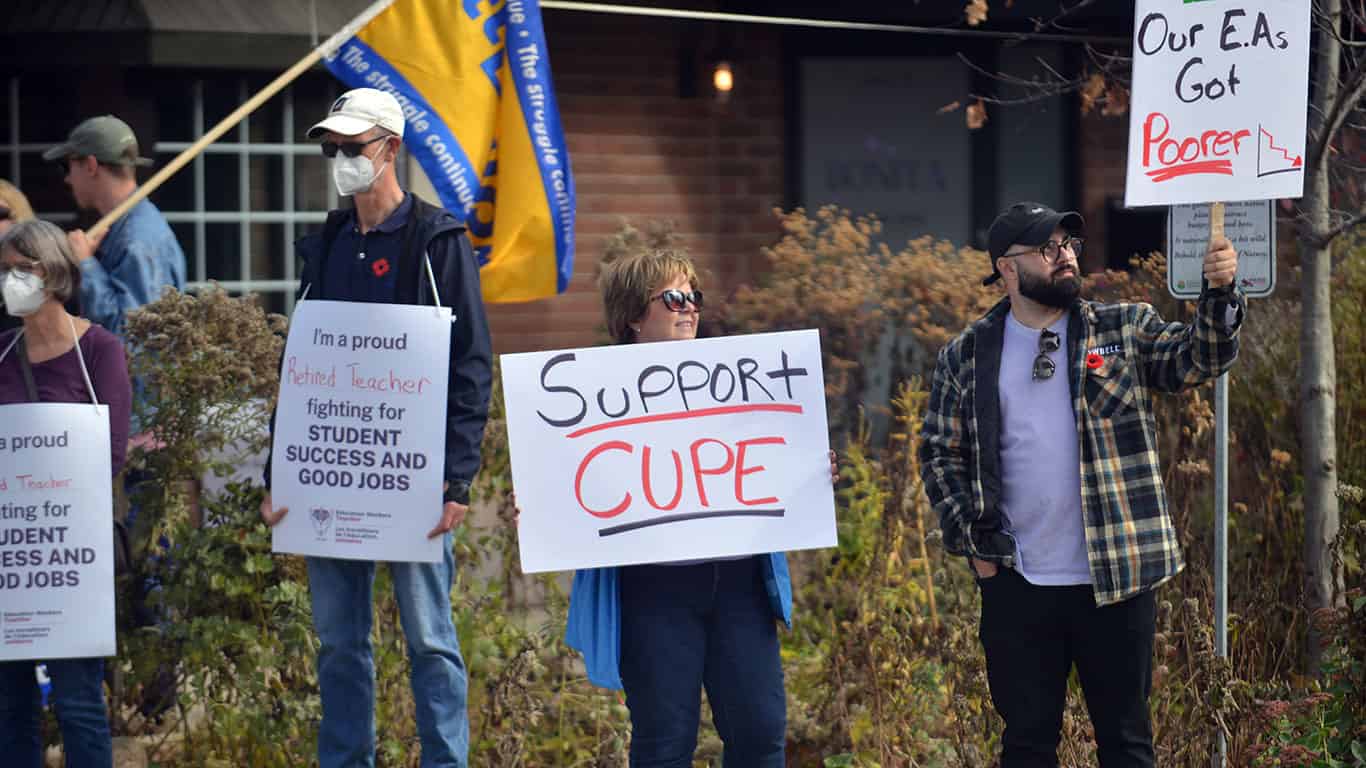A tentative deal between the province and 55,000 education workers averted more strike action that could have closed schools as was the case earlier this month.
The Canadian Union of Public Employees (CUPE) reached an accord Sunday with the provincial government and the Council of Trustees’ Associations. Ratification votes are now underway.
The union represents support workers, including custodians, educational assistants and early childhood educators, who were off the job for two days – November 4 and 7 – after the province passed the pre-emptive Bill 28, which used the notwithstanding clause in the Charter of Rights and Freedoms to make a strike illegal and tried to impose a new contract on the union.
After Premier Doug Ford and Minister of Education Stephen Leece promised to rescind the bill, CUPE called off the strike and both sides went back to the bargaining table. However talks appeared on the verge of breaking down again when CUPE once again gave the required five-day strike notice on November 16. That would have sent workers back to the picket lines on Monday if a new deal was not reached by 5 p.m. on Sunday.
“CUPE’s Ontario School Boards Council of Unions (OSBCU) central bargaining committee, negotiating for 55,000 frontline education workers, was able to reach a middle ground with the Ford government and the Council of Trustees’ Associations (CTA) on wages. Despite that progress, the government refused to invest in the services that students need and parents expect, precipitating this escalation,” the union said in a statement.
“From the beginning, we’ve been focused on improved jobs for education workers and improved services for students. For us, there is no one without the other,” said Laura Walton, president of CUPE-OSBCU, in the release.
“It’s incredibly disappointing that the Ford government categorically refused to put money on the table to give students the type of learning environment they need.”
According to CUPE the new deal includes a wage increase of $1 per hour in each year of a four-year collective agreement and will result in an average increase of 3.59 per cent for all union members each year. For the lowest paid workers, it will result in a wage increase of 4.2 per cent each year of the deal.
The workers will also receive pay for the two days they were off the job, however the new deal does not contain any of the investments for students CUPE was calling for. Walton claimed that the deal is no different than what was offered last week.
This is not a win for governments or education unions, Leece said
“It’s a win for Ontario families who finally have peace of mind knowing their children will remain in the classroom,” he said in a statement.
“After two and a half years of unprecedented disruptions, nothing matters more than stability in our schools. We are pleased to have reached a deal today that will make sure kids are in class catching up on their learning.”
However Walton does not share that same optimism, saying the government was unwilling to move any further.
“As a mom, I don’t like this deal; as a worker I don’t like this deal; as the president of the OSBCU, I understand why this is the deal that is on the table. I think it falls short,” she told reporters on Sunday.
The new deal still has to be ratified by union members. According to CUPE all 67 local chapter presidents adopted a motion to accept the deal on Tuesday and all members will vote on the deal starting today (November 24) until December 5.
CUPE does not represent any education workers at the public school board, meaning they were not impacted by the two-day strike. However as CUPE Local 2512 represents workers at the Waterloo Catholic District School Board, students had two days of remote learning during the strike earlier this month and would have moved back to remote learning if the workers walked out again.
A spokesperson with the school board declined an interview request.
“Other than to say we are grateful the two sides have reached an agreement and schools can remain open, the agreement actually still needs to be ratified in a vote by CUPE members, so it wouldn’t be appropriate for the board to speak about it at this time,” said chief managing officer John Shewchuck.









